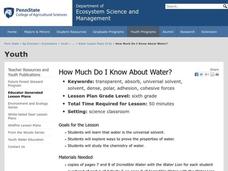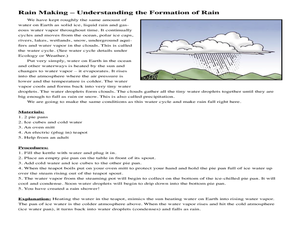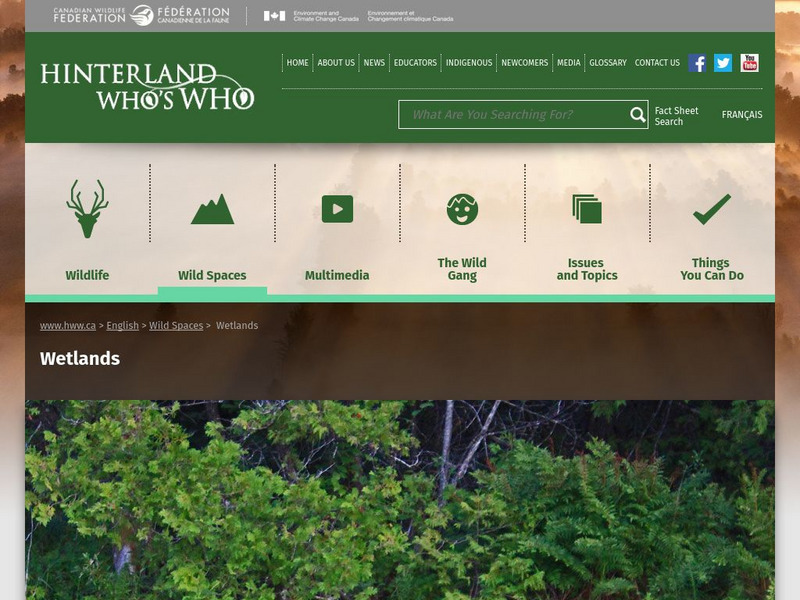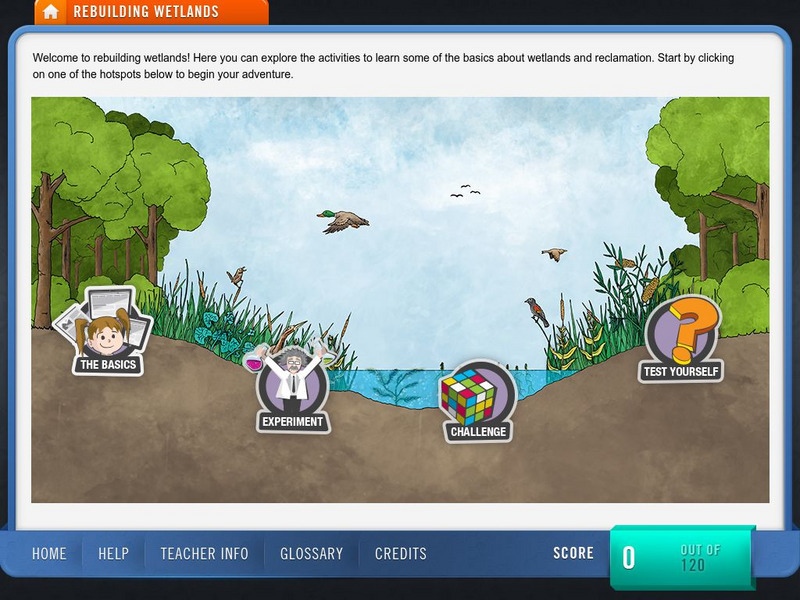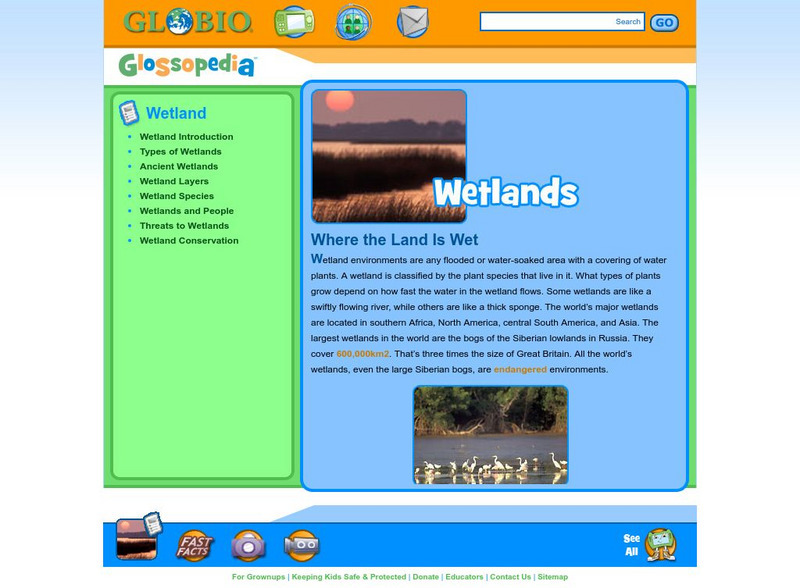Curated OER
Ecology
Middle schoolers examine the relationship between the environment and those that have to live in it. They discover that we are responsible for our environment and understand the consequences of its neglect.
Curated OER
Backwards Goes It Does
Students create a three-dimensional model of the Chicago river watershed to determine the flow of the river at its mouth. They use prepared clear gelatin and topographic maps to discover that the building of canals actually reversed the...
Curated OER
Birds of Wisconsin
First graders explore the job done by ornithologists. They role play identifying the characteristics that make a bird a bird. They discuss what makes each bird species unique. Students are introduced to Wisconsin's most common and rare...
Curated OER
Coastal Biodiversity
In this earth science learning exercise, students identify and locate vocabulary terms related to coastal biodiversity. There are 22 words located in the puzzle.
Curated OER
Water and Rice Agriculture
Second graders investigate the agriculture of rice by reading a study guide. In this food making activity, 2nd graders read about the irrigation of rice fields used for harvesting. Students write three sentences about the...
Curated OER
Birds for Envirothon-Just Ducky!
In this bird activity instructional activity, students click on a duck's name and compare various photos. Page contains several links to additional activities.
Curated OER
Introduction to Simulation Project
Young scholars create a simulated self-sustaining ecosystem. In this biology lesson, students examine the different food chain and ecosystems in their model. They recommend some improvements and changes to an existing ecosystem.
Curated OER
Why Care About Amphibian Population Decline and Malformations?
Students examine the reasons for preserving wildlife. They look at reasons for amphibian malformations and write an essay about the ethical issues that this brings up. They listen to the teacher read quotes about extinction and how the...
Curated OER
Investigating Animals in Water
Students observe small animal activity. They identify local water animals and describe the habitats where water animals can be found. Students collect samples to observe in the classroom.
Curated OER
Water Pollution Graphing Activity
Students describe and identify the link between land use activities within a watershed and water quality. They evaluate the quality of a "water sample" ( a bag of skittles), graph their results, and form a hypothesis about the land use...
Curated OER
How Much Do I Know About Water?
Sixth graders explore ways to analyze the properties of water and examine the chemistry of water. In this water lesson students work in groups and complete several activities.
Curated OER
How Much Do I Know About Water?
Sixth graders explore how water behaves on a penny. In this states of matter lesson, 6th graders observe water as they add drops to a penny. This lesson helps students apply the adhesive properties of water to the water cycle.
Curated OER
Subsidence/ Erosion
Students utilize prior knowledge about the Pontchartrain Basin. In this subsidence/erosion lesson plan, students study the chart on land subsidence and must them identify and find solution for problems caused by erosion.
Curated OER
Rain Making - Understanding the Formation of Rain
Students read and conduct and experiment to learn about rain formation. In this water forms lesson plan, students read about the formation of rain and its purposes. Students then complete a rain experiment activity.
University of Guelph
What Are Wetlands?
Wetlands are an important part of our ecosystem. They are often called the kidneys of the land. Learn about wetlands, where they are located, their value, and what threatens them.
Canadian Wildlife Federation
Hinterland Who's Who: Wetlands
Learn about Canada?s wetlands, what they are and where they are located. Wetlands are divided into two classes: freshwater and saltwater. They are further separated into four main types: ponds, marshes, swamps, and peatbogs. Discover the...
Environmental Education for Kids
Eek!: Habitats: Wetlands
Wetland ecosystems are extremely valuable to wildlife, supporting a greater number of animals than any other type of habitat. Wetlands also absorb flood waters; filter chemicals, sediments, and other impurities out of drinking water;...
National Geographic
National Geographic: Biodiversity in a Wetland Ecosystem
In this lesson, students learn about the biodiversity of a wetlands ecosystem, then focus on the Barataria Preserve near New Orleans. They then research five species that live there, and follow up by trying to identify the land type in...
The Wild Classroom
The Wild Classroom: Biomes of the World: Wetlands Biome
Learn about wetlands ecosystems. Find out about plants, animals, adaptations, and conservation efforts.
Other
Wonderville: Rebuilding Wetlands
An activity where students can learn the basics about wetlands and reclamation. In this interactive module, students can visit five sections to gain knowledge, complete a virtual lab, take an assessment, and solve a challenge. Give...
US Environmental Protection Agency
Epa: Why Are Wetlands Important?
Find out why wetlands provide natural water quality, flood protection, erosion control, recreation and aesthetic appreciation, and natural products.
Globio
Glossopedia: Wetland
Wetlands are an integral piece of Earth's ecology. Wetland structure is described as well as their role in the health of plants and animals. Issues concerning destruction and preservation efforts also discussed.
BBC
Bbc Nature: Wildlife: Wetlands
Take a close-up look at the world of wetlands and discover what lives and grows there through videos, pictures, news, descriptions, and external links. Listen to the various sounds that occur in wetlands.
American Geosciences Institute
American Geosciences Institute: Earth Science Week: Dynamic Wetlands
Students learn about the importance of wetlands and construct models of two types. They then monitor them for two weeks and record their observations.
Other popular searches
- Louisiana Wetlands
- Animal Adaptations +Wetlands
- Animal Adaptations Wetlands
- Freshwater Wetlands
- Animals of the Wetlands
- Wetlands Water Cycle Diagram
- Watersheds and Wetlands
- Inland Wetlands
- Project Wetlands
- Wetland Soil Classification
- Wetlands Habitat
- Abc Book on Wetlands










